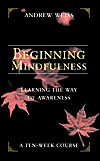
Image by StockSnap
When most of us are introduced to the practice of meditation and mindfulness, usually our opinion is that thinking is bad. After all, we reason, our thinking and ideas have become a layer between the present moment and ourselves. Our mind has convinced us that we are isolated. At least, that is how we often perceive the situation.
Of course, our mind's job is to think. Just as our stomach's job is to digest food, and our eye's job is to see, our mind's job is to generate thought. We cannot stop the thinking process, any more than we can stop the sound of the river. What we can do is liberate ourselves from the tyranny of an undisciplined and rampaging mind. We can do this by understanding the mind better.
The Buddha reminded us that the door to our liberation from suffering lies in seeing clearly how our minds work. In fact, thinking is neither good nor bad; it simply exists, it's neutral. Our relationship to our thinking can be productive or unproductive, positive or negative. So thinking can (and will) go on; that's fine.
Encourage A Positive Relationship With Thinking
To encourage a positive relationship with thinking, we put our attention on the nature of thinking itself and the kinds of thoughts we generate. In this way, we get to know how our thinking minds work. As we get clearer and clearer about the nature of thinking, we are less attached to each thought, less inclined to follow it out to its conclusion or to believe that this one thought is the only reality that exists. In this way, our relationship to our thinking changes, and our liberation begins.
It takes some awareness to notice that our thoughts naturally arise and pass away, even the ones that seem the most stubborn. At times our minds will enter what seems to be an endless stream of repetitive or circuitous thinking. We feel helpless to interrupt the cycle, and we feel that the cycle of thoughts will always be there.
In some people this problem goes to its extreme and produces what we call obsessive thinking. At the other extreme, we can get so scattered in our thinking that we can't keep our minds concentrated on anything for more than a few moments. The mind becomes a wild beast, which it seems we can never bring under control.
Seeing The True Nature Of Thinking
One of the greatest values of mindfulness meditation is how it can help us to see the true nature of thinking: Thoughts are not permanent; they arise and they fall away. Most of us experience following a train of thought, only to find ourselves on a byway that somehow leads us back to the original thought, which then changes and goes on to a totally unrelated thought, and then to... the list goes on.
Even if the thoughts rise and fall, the process of thinking seems so persistent and uncontrollable that the thoughts take us careening off into -- where? Someplace other than here, for sure. If you find this kind of thinking going on, you aren't alone. All of us do this.
Many years ago I sat a meditation retreat with Zen Master Su Bong. He was a monk of very deep experience, with many years of sitting, walking, eating, and working practice inside him. At the end of the retreat, he shared with us that at one point his mind had become completely clear, only breathing was happening, and then a thought came up: "I wonder what would happen if I won the New Hampshire lottery?" He then thought: "This is crazy. I'm a monk, I don't have money, and I don't play the lottery." The thoughts then went away, and his mind cleared again. Then another thought arose: "If I won the lottery, I could buy a boat." This led to another thought: "I don't own anything as a monk, and I wouldn't want a boat anyway." His mind cleared again. Then another thought arose: "If I bought a boat, I could give it to my friend who likes boats." And so it went. Each of his spontaneous thoughts -- "I wonder what would happen if I won the lottery," "If I won the lottery, I could buy a boat," and "If I bought a boat, I could give it to my friend who likes boats" -- arose naturally out of the silence of simply being present.
With each thought that arose, Su Bong's mind commented on it and placed it in the context of his experience and his memories -- "I'm a monk, I don't have money," and "I don't own anything as a monk." Su Bong's mind was doing its job, and his mind manifested thoughts out of the spaciousness of that present moment. All three aspects of the thinking process were present: the moment of pure awareness, the awareness of awareness, and then the "packaging" of the awareness through memory and experience.
Most of the time we remain unconscious of the narrative package and unaware that our thinking is telling us how to interpret what we perceive. As we do more sitting meditation and as our thinking starts to slow down, we can begin to develop awareness of each part of the thought process and disengage from our thinking. The deeper this awareness goes, the more immediate and unobstructed our contact becomes with the present moment. And then mindfulness can occur.
What happens in that moment of direct observation, before we label it, before the thoughts, before the symbolic and conceptual words come forward -- what happens in that moment is authentic mindfulness. The space between the thoughts, the moment of quiet, nonverbal awareness, is the moment of mindfulness.
The Thinking Process Is Ephemeral
When we experience thoughts and the thinking process itself as ephemeral, we touch upon a deeper truth: Everything is ephemeral. We can see this clearly with our thoughts. A thought rises up and it passes away. We can even see it with our thinking process. Our thinking gets quieter and then it becomes more active. But that rising and falling nature is not limited to thoughts and thinking.
As your practice deepens, you will see that everything in the world is like this. Your house, your chair, the sun and trees, and even your favorite friend are all ephemeral. They all manifest in their particular forms for a while and then they "unmanifest."
In the Buddhist world this is called "impermanence," and the Buddha saw this understanding to be crucial in freeing people from suffering and despair. Even your own self, your carefully constructed package of identities and labels, is a construction of thoughts that rise up and pass away.
This aspect of being that each of us calls "myself" is as ephemeral as the cloud passing by. This may be hard to remember when your thinking goes out of control or when your feelings overwhelm you. Because you can experience the ephemeral nature of thinking through mindfulness practice, you can free yourself when the difficult times arrive.
The practice of sitting helps us to cultivate mindfulness. How we manifest the practice in our daily life is our way out. You do not have to become a monk or live apart from the world to do this. It is possible for all of us. If we want our lives and our world to be better, it is necessary.
Reprinted with permission of the publisher,
New World Library. ©2004.
http://www.newworldlibrary.com
Article Source
Beginning Mindfulness: Learning the Way of Awareness
by Andrew Weiss.
 Knowing that most people do not stop their lives to engage in spiritual practice, Buddhist teacher Andrew Weiss has always taught the direct application of practice to daily life. While also teaching sitting and walking meditation, he emphasizes mindfulness — the practice of seeing every action as an opportunity to awaken meditative inquiry. Beginning Mindfulness is intended for anyone practicing in daily life without the luxury of long meditation retreats. Andrew skillfully blends the traditions of his teachers into an easy and humorous program of learning the Buddhist art of mindfulness.
Knowing that most people do not stop their lives to engage in spiritual practice, Buddhist teacher Andrew Weiss has always taught the direct application of practice to daily life. While also teaching sitting and walking meditation, he emphasizes mindfulness — the practice of seeing every action as an opportunity to awaken meditative inquiry. Beginning Mindfulness is intended for anyone practicing in daily life without the luxury of long meditation retreats. Andrew skillfully blends the traditions of his teachers into an easy and humorous program of learning the Buddhist art of mindfulness.
Info/Order this book. Also available as a Kindle edition.
About the Author
 Meditation teacher Andrew JiYu Weiss is ordained in both Thich Nhat Hanh's Order of Interbeing and the White Plum Lineage of the Japanese Soto Zen tradition. Andrew is founder of the Clock Tower Sangha in Maynard, Massachusetts. Visit his website at www.beginningmindfulness.com
Meditation teacher Andrew JiYu Weiss is ordained in both Thich Nhat Hanh's Order of Interbeing and the White Plum Lineage of the Japanese Soto Zen tradition. Andrew is founder of the Clock Tower Sangha in Maynard, Massachusetts. Visit his website at www.beginningmindfulness.com
Video with Andrew Weiss: Meditation Made Simple
{vembed Y=NNFBtCJOPXI}
books_awareness




























